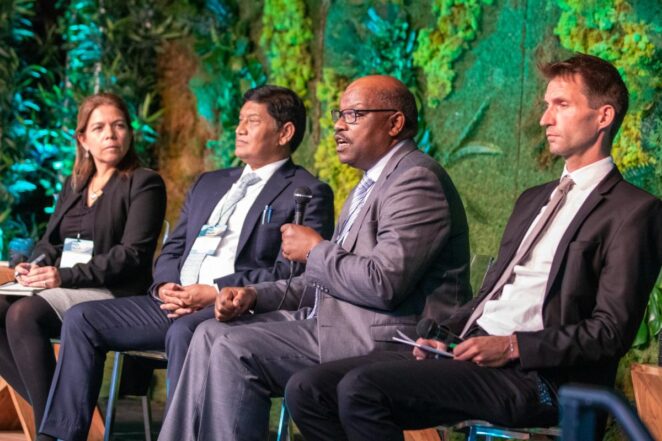Sixth Global Meeting of The Mountain Partnership: Tackling the Climate Crisis at Altitude by Fostering a Community of Practice

Summary
On Tuesday, September 26th, 2022, Adaptation at Altitude (A@A) hosted a side event at the Mountain Partnership’s Sixth Global Meeting in Aspen, Colorado, USA. The Global Meeting brought together over 150 delegates from various countries and organizations to share ideas and work toward sustainable mountain development.
The side event hosted a discussion on how we can increase adaptive capacity to climate change in the Andes, East Africa, the South Caucasus, Hindu Kush Himalaya and beyond! A@A invited participants to exchange on how an improved data and information landscape, tested adaptation solutions, regional collaboration, and interregional exchange are all contributing to more climate-resilient sustainable mountain development. The goal as to foster an international community of practice for mountain adaptation.
The event was moderated by Alex Mackey, from Zoï Environment Network, and featured panelists from A@A partner organizations: Carolina Adler (MRI), Matthias Jurek (UNEP), Karen Price Rios (CONDESAN), Basanta Shrestha (ICIMOD) and Sam Kanyamibwa (ARCOS). Panelists discussed the role that A@A has played in encouraging improved science and data and fostering regional collaboration.
Key Messages from the Event
Some of the key takeaway messages from the session are:
-
The IPCC and especially its recent Cross-Chapter Paper5 on mountains (Adler et al. 2022) constitute a success story of ascience-policy forum for climate-resilient development in mountain area
-
It is important to aggregate data at the global, but also local levels – learning with communities through collaborative action
-
GEO Mountains has managed to walk the talk to exercise open science and fair principles of open data –analyzing existing data consolidating sets on different topics such as biodiversity
-
In the Hindu Kush Himalaya, the 2019 Assessment report brought together over 300 scientists from the region and beyond providing a “mini-IPCC”
-
This led to the HKH Call to Action, a manifesto for the region, which was endorsed by a Ministerial Meeting in 2020
-
It is important to focus on regional science-policy forums to base policies in sound science and evidence
-
In the Andes, A@A has supportedlong time monitoring networks e.g. on mountain forests,supported the development of regional socio-ecological indicators combining natural science and social science approaches
-
It is key toexchange between regional mountain platforms and mechanisms to increase learnings and strengthen science-policy exchange and intraregional collaboration and dialogue, e.g. with the Andean Mountain Initiative
-
The Rio +20 outcome document gave a mandate to strengthen mountain centres of excellences with positive outcomes and strengthened regional structures today
-
The work with regional frameworks and partners to ensure sustainability of actions and regional cooperation is key for sustainable mountain development
-
Align regional activities in mountain ranges with other relevant international timelines and ensure that processes and dialogues continue after project lifecycle
-
Many initiatives and solutions for climate change adaptation in mountains exist, they need to be shared and further implemented through collaborative processes and approaches
-
Multistakeholder approaches should alsoinclude youth
-
On the international level, a narrative of “melting mountains” is missing and should be popularised, similar to “sinking islands”

- Sixth Global Meeting of the Mountain Partnership: Tackling the Climate Crisis at Altitude by Fostering a Community of Practice
- Sixth Global Meeting of Mountain Partnership: Strengthening of the Andean Mountain Initiative
- Global Meeting provides new momentum for mountains
- The Hindu Kush Himalaya Assessment: Mountains, Climate Change, Sustainability and People

Comments
There is no content